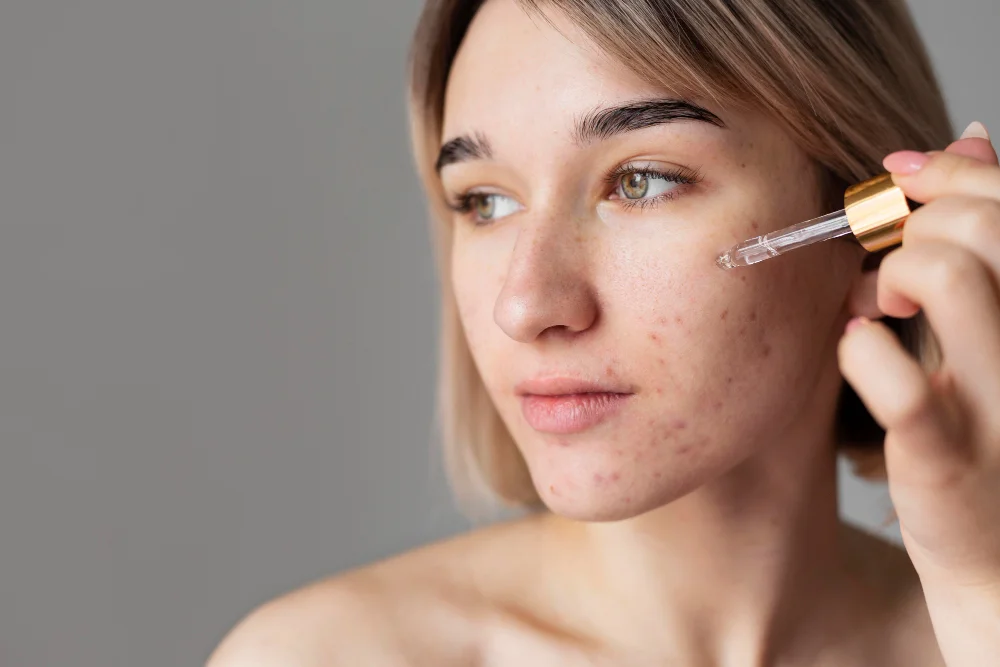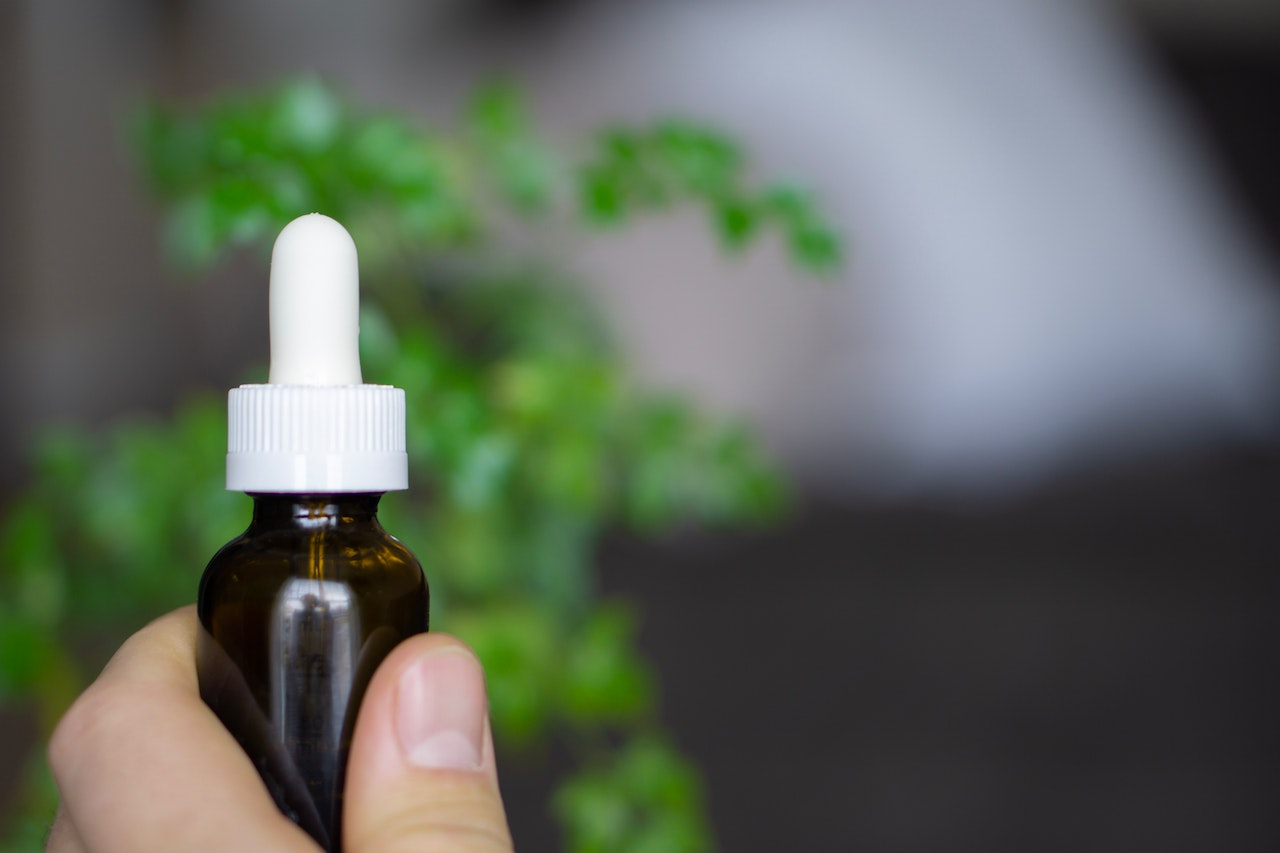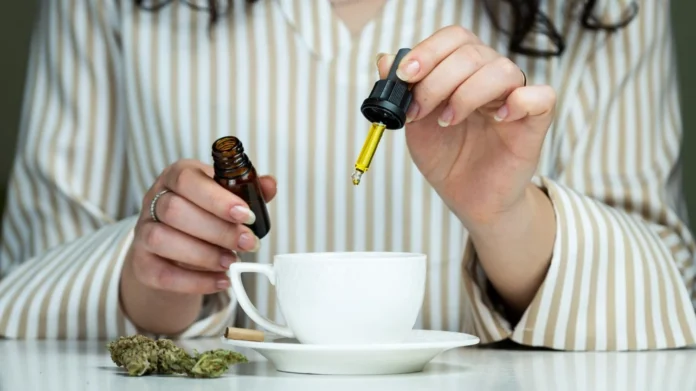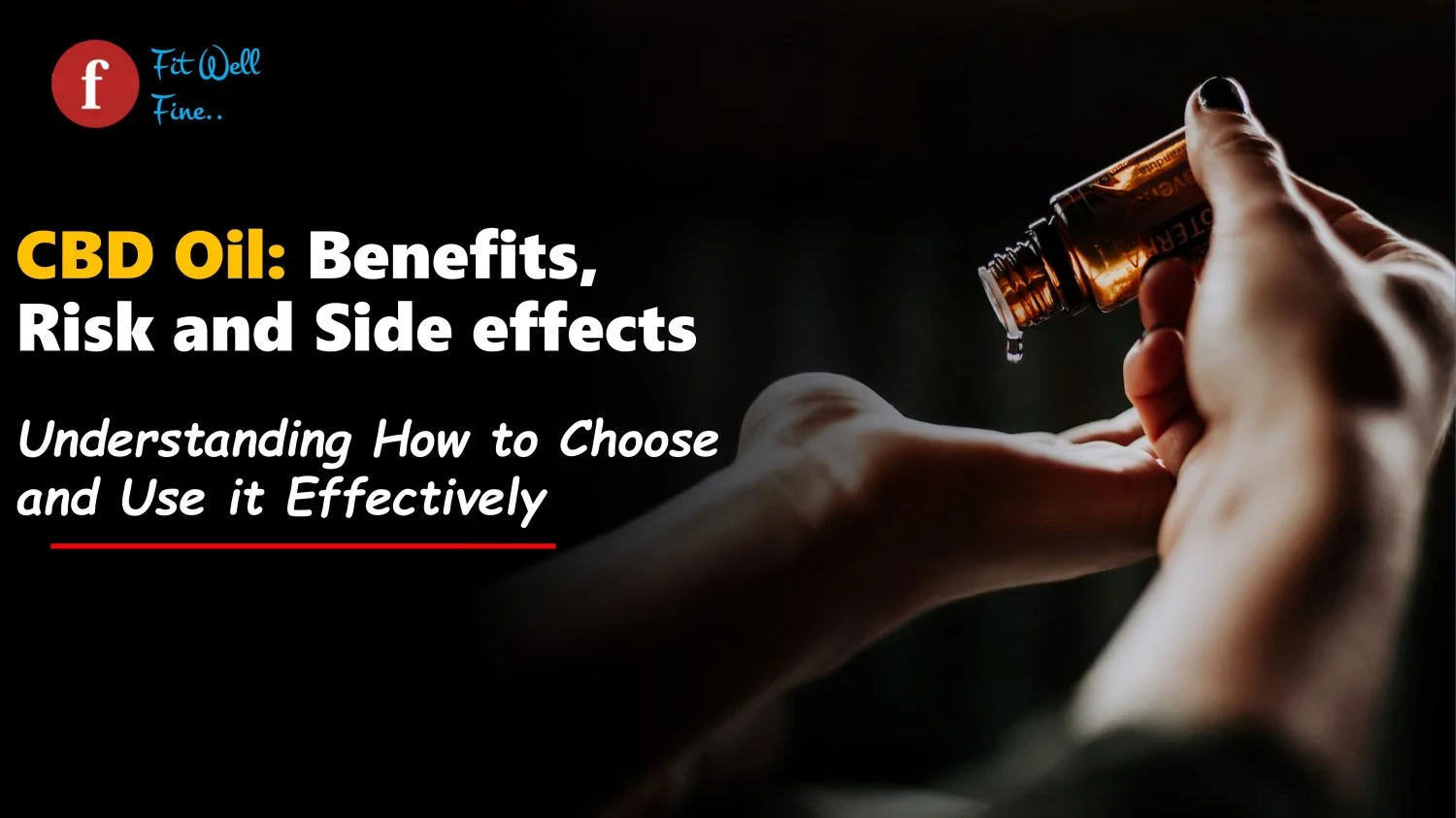CBD oil has gained popularity in recent years for its potential health benefits. It has been promoted as a natural and effective solution for a variety of health issues, including anxiety reduction and chronic pain management. However, it is important to understand what CBD oil is and how it can be used to enhance overall wellness. In this comprehensive guide, we will explore the benefits and side effects of CBD oil, provide tips for selecting the appropriate product and also inform you about the recommended dosage of it.
So, let’s dive in and explore the fascinating world of CBD oil!
Understanding of CBD Oil
What is CBD Oil?
CBD oil is a type of natural product that extract from the flowers, leaves, and stalks of the Cannabis plants, specifically the hemp and marijuana plants. (1)
The cannabis plant contains a variety of compounds called cannabinoids, one of which is cannabidiol (CBD), which has potential health benefits, including reducing anxiety, relieving pain, and improving sleep. (2)
Hemp-derived CBD oil Vs marijuana-derived CBD oil – Which CBD oil is safe?
Both hemp-derived CBD oil and marijuana-derived CBD oil can be safe, but it depends on a few factors.
Hemp-derived CBD oil is typically considered safe and legal in many countries. It is extracted from hemp plants that contain and high levels of CBD and very low levels of THC (less than 0.3%). In many countries Hemp-derived CBD oil is legal and is widely available for purchase. (3)
On the other hand, Marijuana-derived CBD oil which extracted from Marijuana plant, may also be safe, but it may contain higher levels of THC (more than 0.3%), and other compounds that can produce psychoactive effects (“high” sensation). Therefore, in some countries, it is illegal to purchase and use marijuana-derived CBD oil. (3)
Note: Psychoactive effects refer to the changes in mood, perception, or behavior that can occur when certain substances interact with the brain.
How does CBD oil work?
CBD oil works by interacting with the body’s endocannabinoid system (ECS), which plays a role in regulating various physiological processes, such as pain sensation, mood, appetite, and immune function. (4)
When CBD is consumed, it interacts with the ECS by binding to cannabinoid receptors located throughout the body, including the brain, immune system, and peripheral nervous system. This interaction can result in various effects, such as reducing inflammation, alleviating pain, improving mood, and promoting relaxation. (5)
CBD also interacts with other receptors in the body, such as serotonin receptors, which are involved in regulating mood and anxiety. This is why CBD has been studied for its potential use in treating conditions such as anxiety and depression.
Overall, the exact mechanisms by which CBD exerts its effects are still being studied, but it is believed to have a complex interplay with various physiological systems in the body.
10 Significant Health Benefits of CBD Oil

Some potential benefits of CBD oil include:
1. Chronic pain relief
Some research suggests that CBD may reduce chronic pain in people who suffer from arthritis, back pain, headache, and migraines. However, it seems to be most effective when combined with THC (6, 7, 8).
Several human studies have found that a combination of CBD and THC is effective in treating pain related to multiple sclerosis (MS) and arthritis.
CBD interacts with the body’s endocannabinoid system, which regulates pain and inflammation. This interaction can help reduce chronic pain and inflammation in the body (9).
2. Reduce Anxiety
Millions of people worldwide experience anxiety, and despite the availability of numerous medications and therapies, some individuals are opting for CBD as an alternative option.
Research indicates that CBD oil may reduces social anxiety during public speaking tasks. This reduction is attributed to CBD’s interaction with the body’s serotonin receptors, which regulate mood and behaviour. As a result, anxiety levels are reduced. (10)
3. Decrease Depression like symptoms
CBD oil may provide benefits for people with depression, including regulating mood, reducing anxiety, protecting the brain, reducing inflammation, and improving sleep.
A more recent 2018 review of existing studies concluded that CBD has anti-stress effects, which may reduce depression related to stress. (11)
4. Improve sleep quality
CBD oil can help improve sleep quality in people who suffer from insomnia. CBD interacts with the body’s endocannabinoid system, which regulates sleep. This interaction can help improve sleep quality and reduce the symptoms of insomnia. (12)
5. Acne treatment – CBD oil for skincare

CBD oil has been known to reduce acne in people who suffer from this condition.
In 2014, a study was conducted to explore the effect of CBD on sebocytes, which are the cells that produce the oily, waxy substance called sebum that can contribute to the development of acne. (13)
Similarly, a 2017 review found that CBD has anti-inflammatory properties. This may help calm the skin and reduce inflammation that acne can cause. (14)
In addition, CBD interacts with the body’s sebaceous glands, which regulate oil production in the skin. This interaction can help reduce the production of oil in the skin and reduce the occurrence of acne.
It’s important to note that researchers still need to conduct more studies to fully understand the effects of CBD on acne and to determine any potential side effects.
6. Reduce the risk of heart disease
CBD oil has been known to reduce the risk of heart disease in people who have high blood pressure.
In 2017, a small study conducted in England found that CBD may have a positive effect on blood pressure in people without heart conditions. (15)
The study suggested that CBD improved both resting blood pressure and blood pressure spikes related to stress. However, it’s important to note that this was a small study, and more research is needed to fully understand the potential effects of CBD on blood pressure.
CBD interacts with the body’s endocannabinoid system, which regulates blood pressure. This interaction can help reduce the risk of heart disease and improve cardiovascular health.
7. Neuroprotective
Neuroprotective refers to a substance or treatment that helps protect the nerves or nervous system from damage or degeneration. CBD oil, which is derived from the cannabis plant, has been shown in some studies to have neuroprotective properties. (16)
This means that it may be able to help protect the nervous system from damage caused by things like inflammation, oxidative stress, and other harmful factors. However, more research is needed to fully understand its potential for cancer treatment.
8. Improve sexual health
CBD oil has been suggested to have potential benefits for sexual health and function, although further research is needed to fully understand these effects. (17)
One potential benefit of CBD oil for sexual health is its ability to reduce anxiety and promote relaxation. Anxiety and stress can have a negative impact on sexual desire and performance, and CBD oil has been shown to have anxiolytic (anti-anxiety) effects. (18)
9. Reduce seizures in people with epilepsy
CBD has been studied for its potential to reduce seizures in people with epilepsy. Some studies have shown that CBD may be effective in reducing the frequency and severity of seizures in certain types of epilepsy, including Lennox-Gastaut syndrome and Dravet syndrome. (19)
CBD interacts with the body’s endocannabinoid system, which regulates neurological activity. This interaction can help reduce the occurrence of seizures and improve the quality of life for people with epilepsy.
10. Alleviate cancer-related symptoms
CBD may have potential for treating various aspects of cancer, including both the symptoms of cancer and the side effects associated with its treatment. For example, CBD has been shown to have pain-relieving and anti-inflammatory properties, which could help alleviate pain and inflammation associated with cancer. (20)
CBD may also have anti-nausea and vomiting effects, which could help relieve symptoms caused by chemotherapy and radiation therapy. Additionally, some research suggests that CBD may have anti-tumor effects and could potentially slow the growth and spread of cancer cells.
How to Use CBD Oil – Effectively and safely for optimal results.

CBD oil can be consumed in a variety of ways, depending on the desired effect and personal preference. Here are some common ways to use CBD oil:
1. Sublingual
Sublingual application is one of the ways to use CBD oil, and it involves placing a few drops of the oil under the tongue for absorption through the sublingual gland.
Here are the steps to follow when using CBD oil sublingually:
- Choose a high-quality CBD oil and a dropper for accurate dosing.
- Shake the bottle of CBD oil well before use to ensure the contents are well mixed.
- Use the dropper to place a few drops of CBD oil under the tongue. The amount will depend on the strength of the oil and the desired effect.
- Hold the oil under the tongue for 30-60 seconds before swallowing. This allows the CBD to be absorbed into the bloodstream through the sublingual gland, which can result in faster onset and stronger effects.
- Swallow any remaining oil and drink water if needed to wash down the taste.
- Repeat the process as desired, being mindful of the amount of CBD oil used and the effects experienced.
2. Topical
CBD oil can be applied topically to the skin to target localized pain or inflammation. It can be used in the form of creams, balms, or lotions and should be massaged into the affected area for maximum absorption.
Here are the steps to follow when using CBD oil topically:
- Choose a high-quality CBD oil and a suitable topical product, such as a cream, balm, or lotion.
- Cleanse the affected area of the skin and pat it dry with a clean towel.
- Apply a small amount of CBD oil to the affected area and massage it gently into the skin using circular motions. Start with a small amount and gradually increase as needed.
- Allow the CBD oil to absorb into the skin for a few minutes before covering the area with clothing or a bandage.
-
Repeat the process as desired, being mindful of the amount of CBD oil used and the effects experienced.
3. Inhalation
CBD oil can be inhaled through a vaporizer or vape pen. This method allows for quick onset and potent effects, but it may also be harsh on the lungs.
Here are the steps to follow when using CBD oil through inhalation:
- Choose a high-quality CBD oil and a suitable vaporizer or vape pen. Make sure the device is compatible with CBD oil and is in good condition.
- Charge the device fully before use, and read the instructions carefully to ensure you know how to use it properly.
- Fill the vaporizer or vape pen with CBD oil according to the manufacturer’s instructions. Be careful not to overfill or underfill the device.
- Turn on the vaporizer or vape pen and wait for it to heat up. This usually takes a few seconds or minutes, depending on the device.
- Inhale the CBD oil vapor slowly and deeply, holding it in your lungs for a few seconds before exhaling. Start with small puffs and gradually increase as needed.
- Repeat the process as desired, being mindful of the amount of CBD oil consumed and the effects experienced.
4. Edibles
CBD oil can be added to food or beverages, such as gummies, chocolates, or coffee. This method can result in longer-lasting effects, but the onset may be slower due to the digestion process.
Here are the steps to follow when using CBD oil as an edible:
- Choose a high-quality CBD oil and a suitable food or beverage to add it to, such as gummies, chocolates, or coffee.
- Calculate the appropriate dosage of CBD oil based on your weight, desired effect, and the strength of the oil.
- Add the appropriate amount of CBD oil to the food or beverage and mix it thoroughly to ensure even distribution.
- Consume the food or beverage as desired, being mindful of the amount of CBD oil consumed and the effects experienced.
- Wait for the onset of effects, which may take longer than other methods due to the digestion process.
-
Repeat the process as desired, being mindful of the amount of CBD oil consumed and the effects experienced.
Note: When using CBD oil, it’s important to start with a low dose and gradually increase as needed to avoid any potential side effects. It’s also recommended to consult with a healthcare professional before using CBD, especially if you are taking any medications or have any underlying medical conditions.
How to Choose Right CBD product?
Choosing CBD oil can seem overwhelming with so many options on the market. Here are some steps to guide you in selecting the right CBD oil for your needs:
1. Determine the source of the hemp
Look for CBD oil sourced from high-quality hemp plants that are grown without the use of harmful chemicals and pesticides.
2. Check the concentration of CBD oil
CBD oil comes in varying concentrations. Choose a concentration that suits your needs, whether it’s a low concentration for mild symptoms or a higher concentration for more severe symptoms.
3. Look for third-party lab testing
Ensure that the CBD oil you are considering has undergone third-party lab testing to verify its potency and purity. This information should be readily available on the product’s label or website.
4. Consider the extraction method
CBD oil can be extracted using different methods, including CO2 extraction, ethanol extraction, and olive oil extraction. CO2 extraction is considered the gold standard for producing high-quality CBD oil.
5. Read customer reviews
Check what other customers have to say about the product. Look for reviews that mention the product’s effectiveness, taste, and any side effects experienced.
By following these steps, you can choose a high-quality CBD oil that meets your specific needs.
Heads up: Is CBD legal to use?
The legality of using CBD oil depends on the laws and regulations of the country or state where you live. In some places, CBD oil is legal for medical or recreational use, while in others it may be strictly prohibited.
In the United States, for example, the federal government has legalized hemp-derived CBD oil as long as it contains less than 0.3% THC. However, marijuana-derived CBD oil is still illegal because it contains more than 0.3% THC. (21, 23)
In Canada, CBD oil is legal for both medical and recreational use. Other countries, such as Australia and the United Kingdom, allow CBD oil for medical use with a prescription, but it is illegal for recreational use.
The legality of CBD oil in India is a bit unclear. Currently, there are no specific laws in India that regulate CBD oil, and it’s not clear whether it is legal or not. Some sources suggest that CBD oil is legal in India as long as it contains less than 0.3% THC, but this has not been officially confirmed. (24)
However, it is important to note that laws and regulations regarding CBD oil can vary widely between countries and even between states or provinces within a country. Before using any CBD oil product, it is essential to research the laws in your area and to consult with a healthcare professional to ensure that it is safe and appropriate for your individual needs.
Recommended Dosage of CBD
As a general, a starting dose of 5 mg of CBD per day is often recommended. This can be gradually increased to 5-10 mg every 2–3 days up to 40 mg CBD per day, depending on the individual’s needs and response to the CBD. (25)
It’s important to note that there is no one-size-fits-all dosage for CBD, and it’s always best to consult with a healthcare professional before starting any new supplement regimen. Additionally, it’s important to follow the recommended dosage guidelines provided by the manufacturer of the CBD product being used.
Best Time to Take CBD Oil
The best time to take CBD oil can vary depending on the individual and their needs. However, many people prefer to take CBD oil in the morning or evening.
Taking CBD oil in the morning may help promote a sense of calm and focus throughout the day. It may also help support a healthy sleep-wake cycle by regulating the body’s natural circadian rhythm.
On the other hand, taking CBD oil in the evening may be more beneficial for those who struggle with sleep issues or anxiety before bed. CBD oil may help promote relaxation and calmness, making it easier to fall asleep and stay asleep throughout the night.
Ultimately, the best time to take CBD oil will depend on your personal preferences and the specific benefits you are seeking.
Common Side Effects of CBD Oil

1. Dry Mouth
Dry mouth, also known as xerostomia, is a common side effect of CBD oil. It occurs when the salivary glands do not produce enough saliva, leading to a dry, sticky feeling in the mouth. This can cause difficulty speaking, swallowing, and tasting. (26)
To minimize dry mouth, it is recommended to drink plenty of water before and after consuming CBD oil. Chewing sugar-free gum or using saliva substitutes can also help stimulate saliva production.
2. Dizziness
Dizziness is another common side effect of CBD oil. It can be caused by a drop in blood pressure or changes in cerebral blood flow. Symptoms may include lightheadedness, fainting, or a spinning sensation. (27)
To avoid dizziness, it is recommended to start with a low dose of CBD oil and gradually increase it over time. It is also important to avoid consuming CBD oil with alcohol or other drugs that can cause dizziness.
3. Nausea
Nausea is a less common side effect of CBD oil, but it can occur in some people. It may be caused by the interaction between CBD oil and the digestive system. Symptoms may include vomiting, stomach cramps, and loss of appetite. (28)
To prevent nausea, it is recommended to consume CBD oil with food or on a full stomach. Starting with a low dose and gradually increasing it can also help minimize the risk of nausea.
4. Diarrhea
Diarrhea is one potential side effect of CBD oil that has been reported by some users. The reason for this side effect is not fully understood, but it may be related to the way that CBD interacts with the digestive system. CBD has been shown to have a relaxing effect on the digestive tract, which can sometimes lead to loose stools or diarrhea. (29)
5. Changes in appetite and weight
Some people may experience an increase in appetite after using CBD oil, which could lead to weight gain. This is because CBD can interact with the body’s endocannabinoid system, which plays a role in regulating appetite and metabolism. (30)
On the other hand, some people may experience a decrease in appetite after using CBD oil, which could lead to weight loss. This may be due to the way CBD affects certain hormones and neurotransmitters in the body.(31)
6. Increased suicidal thoughts
CBD use may have an association with increased suicidal thoughts and/or behaviour (32). If there are any changes in mood or behaviour, it is important to evaluate whether they may be caused by other medications, the use of CBD, or underlying illnesses. Therefore, it is important for physicians who prescribe CBD to inform their patients and parents/caregivers to watch for any unusual changes in mood or behaviour.
Risks of CBD Oil
CBD oil is generally considered safe, but like any supplement or medication, it can have potential risks. Here are some of the possible risks of using CBD oil:
1. Interactions with other medications
CBD can interact with certain medications, including blood thinners, antiepileptic drugs, and some antidepressants. It’s important to speak with your healthcare provider before using CBD oil if you are taking any medications. (33)
2. Liver damage
In rare cases, high doses of CBD can cause liver damage. This is more likely to happen if you take high doses of CBD for an extended period of time.
One study published in the journal Molecules in 2019 found that high doses of CBD (300-600 mg per day) caused liver damage in mice after just one week of treatment. However, it’s important to note that the mice used in the study were given much higher doses of CBD than what is typically recommended for humans. (34)
3. Quality concerns
Not all CBD products are created equal. Some may contain contaminants, such as pesticides or heavy metals, that could be harmful. It’s important to buy CBD products from reputable sources and to check for third-party lab testing results to ensure the product is pure and safe.
4. Legal issues
While CBD is legal in many states and countries, it is still illegal in some places. Make sure you are familiar with the laws in your area before using CBD oil.
Read more- How to Stop Cough at Night: 12 Best Home Remedies
See more- Quick and Easy Ways to Eliminate Bitter Taste in Your Mouth
Conclusion
CBD oil is a natural extract from the Cannabis plant that has shown potential benefits for a range of health issues, including anxiety, depression, pain, inflammation, seizures, and more. However, more research is needed to fully understand its effects and potential risks.
It’s important to speak with your doctor before using CBD oil, especially if you have any medical conditions or are taking medications. CBD oil is generally considered safe, but some people may experience side effects such as dry mouth, dizziness, and fatigue. It’s generally not recommended to use CBD or any cannabis-derived products during pregnancy or while breastfeeding.
When choosing a CBD oil, look for products that have been third-party tested for potency and purity. There are several ways to use CBD oil, including sublingually, orally, topically, or through vaporization. The best method of consumption will depend on your personal preferences and the specific product you’re using.
Overall, CBD oil has the potential to be a helpful supplement for promoting wellness and managing certain health issues, but it’s important to do your research and speak with your doctor before using it.
FAQs (Frequently Asked Questions)
Q. How much CBD oil should I take?
Ans. The optimal CBD oil dosage varies depending on factors such as your weight, metabolism, and the severity of your symptoms. It’s best to start with a low dosage and gradually increase it until you achieve the desired effects.
Q. Will CBD oil get me high?
Ans. No, CBD oil does not contain enough THC to produce psychoactive effects. THC is the compound in cannabis that produces a “high.” Most CBD oils are derived from hemp, which contains very low levels of THC.
Q. What are the potential benefits of CBD?
Ans. CBD oil has been shown to have potential benefits for a range of health issues, including anxiety, depression, pain, inflammation, seizures, and more. However, more research is needed to fully understand its effects.
Q. How do I use CBD oil?
Ans. CBD oil can be taken orally, sublingually (under the tongue), topically, or inhaled through vaporization. The best method of consumption will depend on your personal preferences and the specific product you’re using.
Q. Can CBD be used during pregnancy?
Ans. It’s generally not recommended to use CBD or any cannabis-derived products during pregnancy or while breastfeeding. Some studies have suggested that cannabis use during pregnancy may be associated with negative outcomes, including lower birth weight and developmental issues.
Q. Can I use CBD for a longer time?
Ans. Yes, CBD (cannabidiol) can be used for a longer time. However, long-term use of CBD oil may lead to changes in liver function, so it’s important to monitor your liver enzymes if you’re using CBD oil on a regular basis. It’s always best to speak with your doctor before using any new supplement or medication for an extended period of time.
Disclaimer: The above information is provided solely for educational purposes. It should not be used for diagnosing or treating any medical condition without consulting a qualified healthcare professional. Before making any changes to your diet or lifestyle, please seek advice from a qualified doctor or dietitian. If you believe you may have a medical emergency, please contact your doctor immediately.


